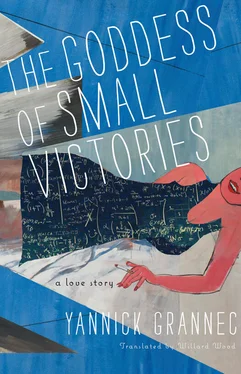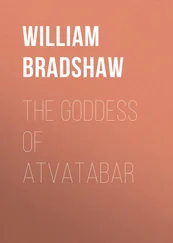“Then you take me for a charlatan, Mr. Oppenheimer.”
“I also don’t set much store by labels. In the best case, you imagine a spiritual door where others are looking for a nice, neatly packaged answer. If memory serves, there is even a pathology associated with this. Apophenia. The tendency to see symbols or meaningful patterns in random data.”
Charles could see his own goods being sold at clearance prices. He opted for irony.
“Apophenia is a natural tendency. We distort reality to make it conform with our vision of the world. I know a specialist in this. My wife!”
Putting both hands around her husband’s neck, Beate tried to strangle him. For a moment, I had had the impression that he was implicating Kurt, who was a past master at distorting reality. I had often enough seen him build cathedrals out of sand, mixing trivial details with great principles. He created a universe in his own image, both powerful and fragile, logical and absurd.
“Before Beate kills me for real, I would like to point something out to you, Robert. Which is that psychoanalysis does not propose pretty answers. Quite the opposite, it gives us solid questions!”
“It hardly gives them to us, dear friend. Your sessions are far from being free.”
I decided to lead the conversation onto smoother terrain. The first commandment for a harmonious meal had been broken long before: Never talk about religion or money at table! If they started to discuss politics, our little lunch would be totally ruined. I assumed the role of silly entertainer and suggested that we attempt some actual experiments in parapsychology. Kurt would go along with this. We often indulged in this kind of game. He used to say that in the distant future, people would be surprised that twentieth-century man had discovered elementary physical particles without ever imagining the existence of elementary psychical factors. I had no idea exactly what he meant, but I was very good at telepathy. After living with a man for thirty years, guessing his thoughts is a question of simple survival. Not surprisingly, all the guests were enthusiastic.
“I have been training for some time in ptarmoscopia … predicting the future with sneezes. I get excellent results.”
Everyone laughed. I’d managed to put Carl Jung back on the shelf of dubious ideas where he belonged.
“And what do you call divination based on our wives’ moods?”
Erich Kahler suddenly appeared at the table, invigorated by his nap.
“Good sense, Charles, plain good sense! Did I miss anything?”
“Adele, I think I hear the telephone ringing.”
Running toward the living room, I tripped over Penny, who was sleeping on the doorstep. I patted her in apology. What a lovely afternoon! It gave me enormous pleasure to see Kurt so lighthearted and talkative. I looked back to savor his smile again.

I put the phone down softly. I stood there motionless, listening to the happy sounds of voices from the garden, breathing in these last minutes of happiness.
When the shade of the poplar reached the dog, I went to Kurt. I put my hand on his shoulder. Everyone was silent. Before I’d even spoken, I saw two large tears form in my friend Lili’s eyes.
“Albert has ruptured an aortic aneurysm. He’s been taken to the Princeton hospital.”
When the last of the dessert tarts had disappeared, Virginia invited her guests to regroup around the living room sofas. Anna decided to slip away from the crowd of smokers and visit Ernestine in her lair. The pantry had been renovated: it glistened with chrome and stainless steel. Only Tine’s collection of old china had survived. Anna had learned her first words of French there: sucre, farine, sel , sugar, flour, salt. The kitchen was spotless. To all appearances indolent, Tine organized her domain with military precision. No one was allowed to get in her way when she was cleaning up. But Anna enjoyed preferential treatment; as a child she had spent long hours watching Tine’s rubber-gloved hands at work. She had listened to Tine talk about her country, about poetry and the latest neighborhood gossip, and she had sat and read beside her, lulled by her Creole songs. She also liked Tine’s little ritual: once the dishes were all put away, Ernestine allowed herself a small glass of punch and a cigarette.
Removing her apron, Ernestine enumerated all her age-related aches. Anna protested as a matter of form. Tine had complained of being old even when she was still the buxom nurse who terrified visiting schoolkids.
“Have you opened my present?”
“Don’t be daft! I haven’t had a minute to myself all evening.”
She fished the package from a drawer and her reading glasses from another. She unwrapped the present carefully; in one of her treasure cabinets she kept a supply of neatly folded paper. She caressed the leather-bound volume: Anthologie de la poésie française . Anna had always known how to please her.
“ Comment vas-tu, mon bel oiseau? How are you, my pretty bird? You look pale.”
There was no need for Anna to embark on a long confession, as Tine had followed every move in the war of nerves between Anna and Leonard, her two adopted children.
“Have you spoken to Leo?”
“Spoken about what?”
“There you go again! Why make it simple when you can complicate it? Si c’est pas malheureux, vous deux! The two of you are hopeless! I never understood what you saw in that idiot from New York. What was his name anyway?”
“William. He got married last year.”
Leonard burst into the kitchen.
“This is a private conversation, young man. What brings you poking around here?”
“I refuse to hold a tin cup under Richardson’s nose.”
Tine tried to smooth Leo’s hair with the flat of her hand; he skipped out of reach, too tall for her now. A last pencil mark on the doorjamb attested to it. Ernestine had had to bully the painters to keep the measurements from being erased.
The French mathematician poked his Roman nose into the kitchen, looking for seconds on dessert. Ernestine simpered at his compliments; twenty years earlier she would have eaten him alive for an afternoon snack. Though she had always been discreet, the neighborhood buzzed with rumors about her appetites. Virginia Adams, despite her suspicions, had never caught Tine red-handed. And she was less concerned about her husband’s infidelities than she was about losing a gem of Ernestine’s caliber. For his part, Calvin was too concerned with his reputation to embark on an adventure of this kind; he made do with hotel bars in the wake of conferences.
Tine bustled around to prepare a plate and open a bottle for her new admirer. Anna pulled out a chair for him. Leo could barely contain his irritation. By monopolizing the interest of the two women, the Frenchman was invading his territory. Leo Adams had been at the center of everything in this house, claiming even the little attention that hadn’t already been given him by his mischief. He wanted to stay in the center, and he addressed Anna.
“So, you’ve been assigned to recover Gödel’s papers? His widow must be at least three hundred years old. A survivor of Princeton’s heroic postwar years!”
Pierre Sicozzi watched the young woman through his ruby-colored glass, while she, embarrassed, fingered the book of poetry.
“Ah, yes, Calvin mentioned that to me. She must be an extraordinary character to have lived with such an unusual man.”
“She’s not always easy company, but she is generous with her stories.”
“You’re a research librarian who stands very close to History.”
“She’s resisting turning over the archive to us. She has a grudge against the academic establishment. She’s never been thought well of. Yet Adele is a very engaging person.”
Читать дальше













